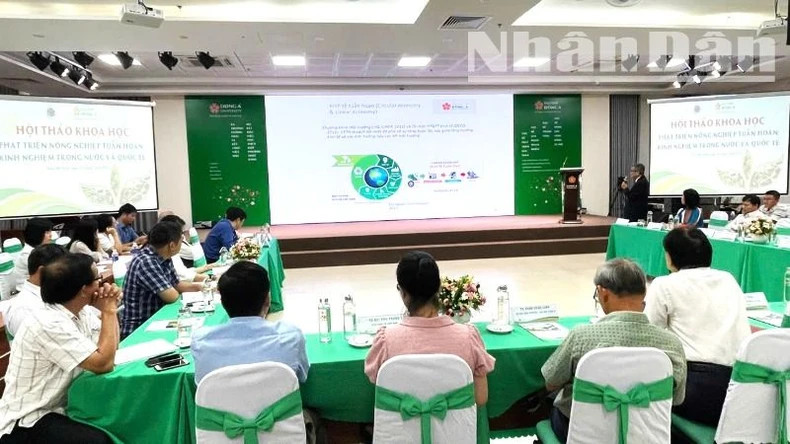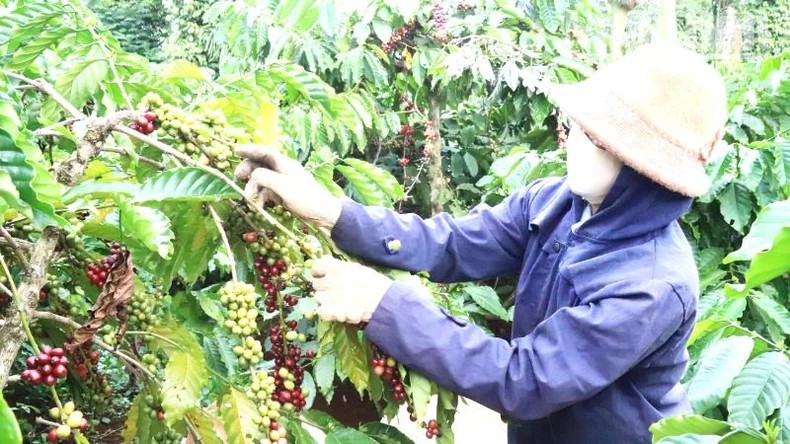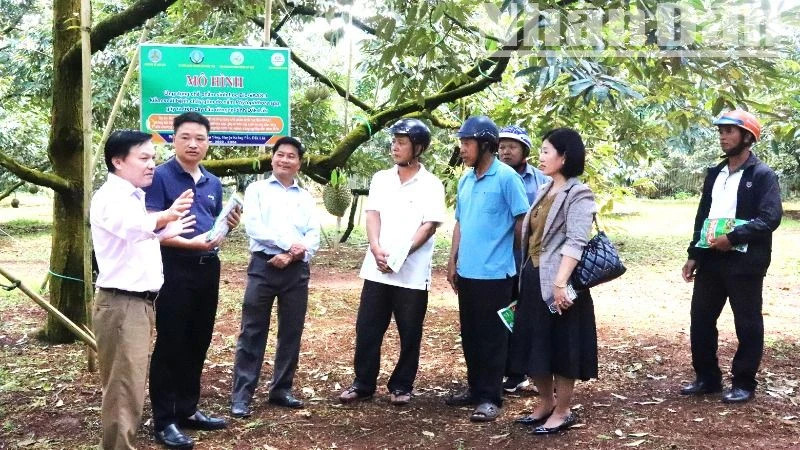In particular, the development of circular agriculture with many advantages has been chosen and is being implemented by the agricultural sector of Dak Lak Province because it is suitable for reality and current trends.
Nguyen Hac Hien, Director of the Crop Production and Plant Protection Sub-Department of Dak Lak Province, said that the agricultural sector of the country in general and Dak Lak Province is facing many difficulties and major challenges, from internal issues and objective factors such as resource depletion, environmental degradation, climate change, market fluctuations and changes in consumer tastes.
Through research, as well as international and domestic experience, it is shown that the development of circular agriculture is an urgent practical requirement and suitable for the current reality, especially in a mountainous province where the economy is still heavily dependent on agriculture, like Dak Lak.
 |
| Scientists share experiences on developing circular agriculture at the Scientific Workshop themed "Developing circular agriculture: Domestic and international experiences" organised by the Vietnam Institute of Economics in coordination with Dong A University in Dak Lak Province. |
However, the development of circular agriculture in Dak Lak is currently very limited. To promote the development of circular agriculture in Dak Lak, the Vietnam Institute of Economics, in collaboration with Dong A University, recently organised a scientific workshop themed "Developing circular agriculture: Domestic and international experiences" in Buon Ma Thuot City. The workshop attracted the attention of managers, scientists departments, branches and localities in the province.
Associate Professor Dr Tran Thi Lan Huong, Vietnam Academy of Social Sciences, chaired the workshop and said that circular agriculture is a trend that many countries are choosing to develop to adapt to climate change, environmental pollution, and resource depletion while aiming for sustainable development.
In Vietnam, circular agriculture is identified as one of the priorities in sustainable agricultural development, serving the Socio-Economic Development Strategy for 2021-2030 with a vision for 2045.
Vietnam has built a roadmap, mechanisms, policies and laws to form and operate a circular economic model, encouraging the development of circular economic models to comprehensively and effectively use the production process output.
Associate Professor, Dr
Tran Thi Lan Huong
Nguyen Hac Hien, Director of the Crop Production and Plant Protection Sub-Department of Dak Lak, said: With a relatively large source of agricultural by-products, in recent times, in Dak Lak Province, the circular agricultural production models to utilise agricultural by-products for reuse as fertilisers and animal feed in a closed loop have become increasingly popular in the province.
These models have significantly reduced input costs, contributing to improving the competitiveness of the province's agricultural products. This is a sustainable direction for the province's agricultural sector now and in the future.
 |
| Many farmers in Dak Lak produce coffee according to the circular agricultural model, but the area is not large. |
Dr Tran Ngoc Thanh, Director of the Central Highlands Institute of Agriculture and Rural Development, Dong A University, said: Dak Lak is a province with a large agricultural production area, including many types of long-term industrial crops with leading areas and output in the country such as coffee, pepper, cashew, rubber and fruit trees with high economic value such as durian and avocado.
However, the province's development of circular agricultural production models is still modest, and the use of inorganic fertilisers is still high, affecting the crop exploitation cycle and quality.
Therefore, Dak Lak Province needs to promote the development of a circular economy in agriculture to adapt to climate change and improve crop productivity and quality. The circular economy in agriculture is a cyclical production process in which waste and by-products of this production process are inputs for other production processes through the application of ecological, technical, biotechnological or natural principles. Thereby, it is necessary to optimise resource efficiency, reduce emissions to the environment, protect the ecosystem, improve human health, and achieve high economic efficiency.
In addition, the province's agricultural sector needs to form specialised areas for high-quality agricultural products.
Dak Lak Province needs to promote the development of a circular economy in agriculture to adapt to climate change and improve crop productivity and quality. The circular economy in agriculture is a cyclical production process in which waste and by-products of this production process are inputs for other production processes through the application of ecological, technical, biotechnological or natural principles. Thereby, it is necessary to optimise resource efficiency, reduce emissions to the environment, protect the ecosystem, improve human health, and achieve high economic efficiency.
Dr Tran Ngoc Thanh
Associate Professor Dr Tran Thi Lan Huong shared that in the country and, particularly, Dak Lak Province, many circular agricultural production models are effectively implemented in many fields.
However, circular agricultural models have only been applied on a small-scale production scale, and linear agricultural practices that pursue immediate profits are difficult to change, so the ability to apply circular agriculture is not widely popularised.
People are trained in circular agriculture practices but do not have a commercial agricultural mindset, so these models are mostly spontaneous. Awareness and thinking about circular agricultural economics and environmentally friendly agricultural products are still limited. Which circular agricultural production is appropriate has not been specifically studied and properly evaluated.
Production, according to the value chain, with certification and meeting standards, is not popular, so when applying the production method towards circular agriculture associated with product consumption, achieving high economic results will pose many challenges.
To promote the widespread development of circular agriculture, contributing to the successful implementation of the Party and State's goals on circular economy and green economy, especially in a province with strengths in agricultural economy like Dak Lak, the scientists proposed that Dak Lak Province needs to perfect institutions and policies to create a legal corridor for the formation and development of circular economic models in agricultural production and rural development.
It is necessary to research, develop and master technologies for recycling and reusing agricultural by-products. It is necessary to train and foster a team of workers to research and deploy technologies for processing by-products in agriculture and invest in research and transfer of science and technology in processing agricultural by-products.
It is necessary to promote the participation of private sectors, organisations, and individual farmers in the circular agricultural value chain in terms of nutrition, water circulation, energy circulation, and by-product circulation, and models to enhance the efficient use of land, water and energy resources.
In addition, the province needs to promote the improvement of the investment attraction environment to mobilise and promote foreign investment projects that meet the criteria of circular agriculture, focusing on projects of a cross-sectoral nature, regional linkages associated with emission reduction and adaptation to climate change.
It is necessary to coordinate with international organisations and experts to support localities in integrating the contents of circular agricultural development into strategies, planning and socio-economic development plans in localities.
















